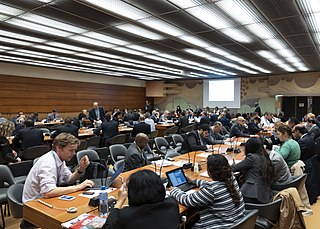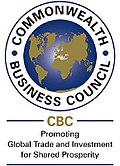Private sector development (PSD) is a term in the international development industry to refer to a range of strategies for promoting economic growth and reducing poverty in developing countries by building private enterprises. This could be through working with firms directly, with membership organisations to represent them, or through a range of areas of policy and regulation to promote functioning, competitive markets.
The Deutsche Gesellschaft für Internationale Zusammenarbeit (GIZ) GmbH, often shortened to simply GIZ, is a German development agency headquartered in Bonn and Eschborn that provides services in the field of international development cooperation and international education work. GIZ's main commissioning party is Germany's Federal Ministry for Economic Cooperation and Development (BMZ). Other commissioners include European Union institutions, the United Nations, the private sector, and governments of other countries. In its projects GIZ works with partners in national governments, actors from the private sector, civil society and research institutions. It is the organization's self-declared goal to deliver effective solutions that offer people better prospects and sustainably improve their living conditions.

The Brunei Darussalam–Indonesia–Malaysia–Philippines East ASEAN Growth Area (BIMP-EAGA) is a cooperation initiative established in 1994 to spur development in remote and less developed areas in the four participating Southeast Asian countries.
Pakistan Software Export Board (PSEB) is an apex Government body mandated to promote Pakistan's IT Industry in local and international markets. PSEB facilitates the IT industry through a series of projects and programs. PSEB was established through an executive order vide Cabinet Division's notification dated 12th June 1995.
The Indonesia–Malaysia–Thailand Growth Triangle (IMT-GT) started as an early attempt at economic liberalisation & integration in ASEAN. It was formally endorsed by Indonesia’s President Suharto, Malaysia’s Prime Minister Tun Dr. Mahathir Mohammad and Thailand’s Prime Minister Chuan Leekpai in 1993.
The Zimbabwe National Chamber of Commerce is a private sector voluntary organization established in 1894 for The Chamber is established for the purpose of developing, promoting, and lobbying for its members and the local business community.
The Sustainable Commodity Initiative (SCI) is a joint initiative launched by the International Institute for Sustainable Development (IISD) and the United Nations Conference on Trade and Development (UNCTAD) in 2003. The SCI works closely with the international community to discover ways to ensure that sustainable practices are adopted into commodity production and trade that enhance social, environmental and economic welfare on a global scale. The SCI was formed to facilitate the development of sustainable commodity production and trade sectors. The initiative works collaboratively with producers and producer organizations, voluntary sustainability initiatives (VSI's), the private sector, government institutions and development focussed NGOs. The initiative receives project funding from numerous governments worldwide, United Nations agencies, foundations, the private sector and individual donors.
Local Economic Development (LED) is an approach to economic development, of note in the developing world that, as its name implies, places importance on activities in and by cities, districts and regions. Local economic development combines economic development activities, urban planning, infrastructure development and social development activities to improve local conditions. LED encompasses a range of disciplines including physical planning, economics and marketing, all with the goal of building up the economic capacity of a local area to improve its economic future and the quality of life for all.

The Eurasian Development Bank (EDB) is a regional development bank established by the Russian Federation and the Republic of Kazakhstan in 2006. It has six member states located in both Asia and Europe, primarily in the former territory of the Soviet Union, including Armenia, Belarus, Kyrgyzstan, and Tajikistan. Other states and international organisations are able to become members by signing up to the bank's founding agreement.

The Egyptian Ministry of Communications and Information Technology (MCIT) is the government body responsible for information and communications technology (ICT) issues in the Arab Republic of Egypt. Established in 1999, MCIT is responsible for the planning, implementation and operation of government ICT plans and strategies. MCIT is led by the Minister of Communications and Information Technology, who is nominated by the Prime Minister and is a member of the cabinet. The current ICT Minister is Amr Talaat who assumed the position on 14 June 2018. MCIT is headquartered in Smart Village Egypt, in 6th of October, Giza Governorate, in the Cairo metropolitan area.

Northern Corridor Economic Region was established with the aim to accelerate economic growth in the northern region of Peninsular Malaysia, encompassing the states of Kedah, Pulau Pinang, Perak and Perlis. Since its inception in 2007, NCER has evolved progressively and consistently, aligned with the government's effort to promote inclusive and sustainable development to reduce regional imbalances and provide equitable economic growth across the country. To sustain this growth momentum and achieve fair wealth distribution, the region continuously spearheads bold measures to pave the way for innovative and sustainable initiatives that contribute to the optimal well-being and shared prosperity of the rakyat. This is achieved by leveraging on the strengths of all four states to form a synergy in enhancing the job creations, encourage entrepreneurship, achieve high income and attract private investments. NCER welcomes foreign investment and business opportunities through a conducive and secured environment for investors. Its close proximity and economic links to key export markets in Asia as well its strategic location makes NCER an attractive destination of any business operations.

The Fisheries Research and Development Corporation (FRDC) is a statutory corporation that manages research and development investment by the Australian Government and the Australian fishing and aquaculture commercial, recreational and Indigenous sectors.
Arab British Chamber of Commerce established 6 February 1975, is an international trade organisation based in the heart of London's prestigious Mayfair. Although a not-for-profit body, its role is to encourage, promote and facilitate trade, investment and joint ventures since 1975 between participating representatives of Arab states and of the United Kingdom (UK).
The National Centre for Cold-chain Development (NCCD) is an autonomous think tank body established by the Government of India with an agenda to positively impact and promote the development of the cold-chain sector in the country. NCCD was registered under the Society Registration Act, 1860 and given sanction by the Union Cabinet of India on 9 February 2012 in a session chaired by the country's Prime Minister.

The biennial World Investment Forum (WIF) is organized by the United Nations Conference on Trade and Development (UNCTAD) to promote investment for sustainable development and facilitate policy dialogue among a diverse community of investment stakeholders. The forum brings together policymakers, including Heads of State and Government, Ministers and other government officials responsible for investment; representatives from the private sector, including CEOs; international organisations working in the area of sustainable development and poverty reduction; thought leaders from academia and research institutions; and other members of the international investment community, including treaty negotiators, investment promotion and location experts, heads of sovereign wealth funds, heads of stock exchanges, and NGOs.

The South Asia Subregional Economic Cooperation (SASEC) Program, set up in 2001, brings together Bangladesh, Bhutan, India, Maldives, Myanmar, Nepal, and Sri Lanka in a project-based partnership to promote regional prosperity by improving cross-border connectivity, boosting trade among member countries, and strengthening regional economic cooperation. As of June 2020, SASEC countries have implemented 61 regional projects worth over $13 billion in the energy, transport, trade facilitation, economic corridor development, and information and communications technology (ICT) sectors. The Manila, Philippines-based Asian Development Bank (ADB) serves as the Secretariat for the SASEC member countries.
Science and technology in Uganda examines government efforts to develop a national innovation system and the impact of these policies.

Sustainable Development Goal 17 is about "partnerships for the goals." One of the 17 Sustainable Development Goals established by the United Nations in 2015, the official wording is: "Strengthen the means of implementation and revitalize the global partnership for sustainable development". The Goal has 17 targets to be achieved by 2030, broken down into five categories: finance, technology, capacity building, trade and systemic issues. Progress towards targets will be measured by 25 indicators.

Sustainable Development Goals and Lebanon explains major contributions launched in Lebanon towards the advancement of the Sustainable Development Goals SDGs and the 2030 agenda. Multi-stakeholder forums were held by different UN agencies including the UN Global Compact Network in Lebanon during the late 2010s for the advancement of Global Goals and their Impact on Businesses in Lebanon. The latest two were held on October 18, 2018 and October 2019 under the title of connecting the global goals to Local Businesses.

Dr. Chris Kiptoo is a Principal Secretary (PS) for the Ministry of Environment and Forestry in Kenya . He assumed office on January 2020, following reassignment by H.E. President Uhuru Kenyatta. Prior to this assignment, Dr. Kiptoo was the Principal Secretary, State Department for Trade in the Ministry of Industry, Trade, and Cooperatives from December 2015. Before his appointment as Principal Secretary Trade, Dr. Kiptoo worked for three years at TradeMark East Africa’s (TMEA) as the Kenya Country Director. He has also had a career spanning 15 years at the Central Bank of Kenya (CBK) as a manager during which he was seconded to the International Monetary Fund (IMF), the Capital Markets Authority of Kenya (CMA) as Senior advisor and manager special projects, and to the Office of the Prime Minister (OPM) Kenya as economic adviser to the prime minister, then Raila Odinga. Dr. Kiptoo also had a short stint at National Cereals and Produce Board (NCPB).










